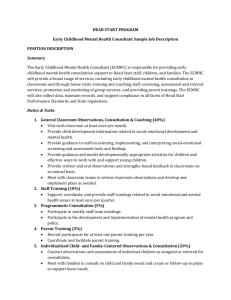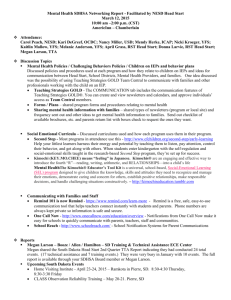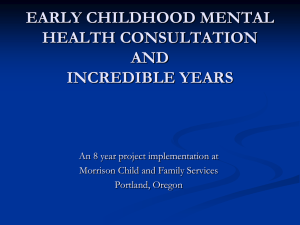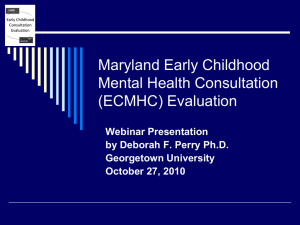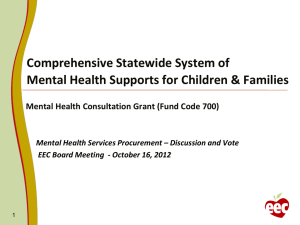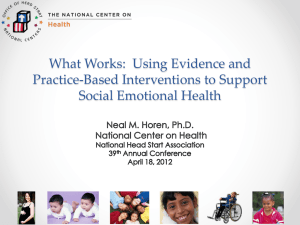Wraparound: A Team-Based Planning Process to Support
advertisement
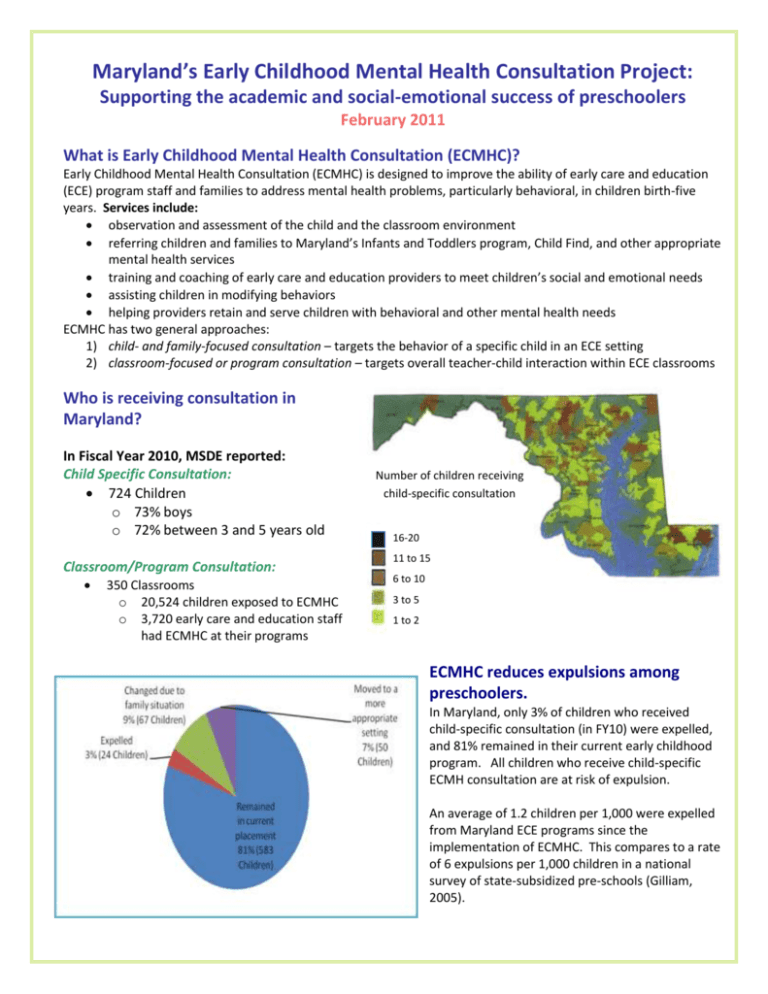
Maryland’s Early Childhood Mental Health Consultation Project: Supporting the academic and social-emotional success of preschoolers February 2011 What is Early Childhood Mental Health Consultation (ECMHC)? Early Childhood Mental Health Consultation (ECMHC) is designed to improve the ability of early care and education (ECE) program staff and families to address mental health problems, particularly behavioral, in children birth-five years. Services include: observation and assessment of the child and the classroom environment referring children and families to Maryland’s Infants and Toddlers program, Child Find, and other appropriate mental health services training and coaching of early care and education providers to meet children’s social and emotional needs assisting children in modifying behaviors helping providers retain and serve children with behavioral and other mental health needs ECMHC has two general approaches: 1) child- and family-focused consultation – targets the behavior of a specific child in an ECE setting 2) classroom-focused or program consultation – targets overall teacher-child interaction within ECE classrooms Who is receiving consultation in Maryland? In Fiscal Year 2010, MSDE reported: Child Specific Consultation: 724 Children o 73% boys o 72% between 3 and 5 years old Classroom/Program Consultation: 350 Classrooms o 20,524 children exposed to ECMHC o 3,720 early care and education staff had ECMHC at their programs Number of children receiving child-specific consultation 16-20 11 to 15 6 to 10 3 to 5 1 to 2 ECMHC reduces expulsions among preschoolers. In Maryland, only 3% of children who received child-specific consultation (in FY10) were expelled, and 81% remained in their current early childhood program. All children who receive child-specific ECMH consultation are at risk of expulsion. An average of 1.2 children per 1,000 were expelled from Maryland ECE programs since the implementation of ECMHC. This compares to a rate of 6 expulsions per 1,000 children in a national survey of state-subsidized pre-schools (Gilliam, 2005). Maryland’s ECMHC Evaluation The Maryland State Department of Education is funding the evaluation of Maryland’s ECMHC in order to better define the Maryland model of ECMHC and to understand its impact on children’s behavioral and school outcomes. The evaluation is being led by researchers at the University of Maryland and Georgetown University, working in collaboration with community and Minority Business partners. Evaluation data is gathered upon initiation of consultation services and again at 4 months or discharge. What are the most critical findings of Maryland’s ECMHC Evaluation to date? 1. ECMHC improves preschool climate ECMHC has shown a significant, positive impact on all aspects of classroom functioning measured by the Preschool Mental Health Climate Scale (PMHCS, Gilliam, 2007). 5 4 3 2 1 Baseline Follow-up These improved domains are all critical to children’s school success, particularly for students with emotional and behavioral challenges. Mean SDQ Rating Across Classrooms 1.8 2. ECMHC improves children’s social and behavioral problems in the classroom ECE classroom teachers rated the extent and impact of child problem behaviors in the classroom using the Strengths and Difficulties Questionnaire (SDQ), a measure of children’s social-emotional behavior. 1.75 1.7 The reduction in mean levels of problem behavior on the SDQ from baseline (preconsultation) to follow-up (post-consultation) was highly significant. 1.65 1.6 1.55 1.5 Baseline Follow-up A reduction in children’s behavior problems in a classroom promotes a more productive learning environment for students, and reduces teacher stress.
